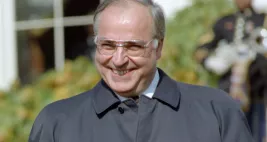May 12, 1993
The Chancellor's [Helmut Kohl's] Telephone Conversation with Russian President Yeltsin on 11 May 1993 17.30-17.40 hours
Gruppenleiter 21 Bonn, den 12. Mai 1993
V e r m e r k
Betr.: Gespräch des Herrn Bundeskanzlers mit dem russischen Präsidenten Boris N. Jelzin Dienstag, 11. Mai 1993, 17.30 - 17.40 Uhr[1]
Nach herzlicher Begrüßung und kurzem Austausch über die beiderseitigen Treffen mit dem kanadischen PM Mulroney drückt der Bundeskanzler seine Freude darüber aus, daß es dem Präsidenten offensichtlich wieder gutgehe.
Präsident Jelzin bestätigt dies - er könne nicht klagen, es gehe etwas besser.
Der Bundeskanzler hält es für sehr wichtig, daß Rußland eine konstruktive Haltung in der Frage Bosnien/Serbien einnimmt und beibehält. Dies sei für die internationale Reputation Rußlands ganz entscheidend.
Präsident Jelzin sieht dies genauso. Man könne gar nicht anders handeln, sonst könne sich aus der Situation ein Weltkrieg entwickeln.
Der Bundeskanzler pflichtet bei und betont, die bosnischen Serben müßten jetzt bereit sein, vernünftig einzulenken.
Präsident Jelzin erwidert, dies müsse ohne Zweifel so sein. Rußland bearbeite die bosnischen Serben ganz ernsthaft, damit sie diese Haltung einnehmen. Der stellvertretende AM Tschurkin sei als sein persönlicher Vertreter vor Ort.
Der Bundeskanzler hält die Haltung Rußlands für ganz wichtig, weil die Serben am meisten auf Rußland hörten. Der Präsident möge dafür sorgen, daß den Serben bewußt sei, daß er wolle, daß sie mit dem Schlachten und Schießen ein Ende machten.
Präsident Jelzin bestätigt, er tue alles, um das Blutvergießen zu beenden und die bosnischen Serben zu bewegen, dem Vance-Owen-PIan zuzustimmen, damit man die Bombardierung vermeiden könne - dies wolle er nicht zulassen.
Der Bundeskanzler wirft ein, die Bombardierung sei nur zu vermeiden, wenn die bosnischen Serben mit dem Morden aufhörten.
Präsident Jelzin ist einverstanden.
Sodann fragt er den Bundeskanzler, wann er ihn zum vereinbarten Treffen im Juli erwarten dürfe.
Der Bundeskanzler betont, er werde sein Versprechen einlösen, könne aber derzeit noch keinen Termin nennen.
Präsident Jelzin unterstreicht sein großes Interesse an einem Treffen im Juli. Auf Fragen des Bundeskanzlers ergänzt er, außer dem G-7-Gipfel in Tokio habe er im Juli keine Auslandsverpflichtungen.
Der Bundeskanzler sagt zu, sich in der Terminfrage bald zu melden.
Freundschaftliche Verabschiedung.
(Dr. Kaestner)
[1] BArch, B 136/59731, 263-264.
Head of Division 21 Bonn, 12 May 1993
M e m o r a n d u m
Subject: The Chancellor's Telephone Conversation with Russian President Yeltsin on 11 May 1993 17.30-17.40 hours[1]
After cordial greetings and a short exchange about one’s meetings with Canadian Prime Minister Mulroney, the Chancellor says that he was delighted that President Yeltsin apparently felt much better again.
President Yeltsin confirmed that and says he had no real complaints, it went somewhat better.
The Chancellor says it was very important for Russia to adopt and to maintain a constructive position in the question related to Bosnia/Serbia. This was truly decisive for Russia’s international reputation.
President Yeltsin saw things very much along the same lines. One could not adopt a different approach. Otherwise, the situation might turn into another world war.
The Chancellor affirms and says that the Bosnian Serbs ought to be ready to come around and take a sensible line now.
President Yeltsin replies that this ought to happen without any doubt. Russia was seriously working on the Serbs in order to bring them around. Deputy Foreign Minister Churkin was on site as his personal envoy.
The Chancellor considers Russia’s position as enormously relevant as Russia was Serbia’s most important interlocutor. The President had to make sure that the Serbs would understand they had to terminate the butchering and the shooting.
President Yeltsin confirms that he was doing everything in order to stop the bloodshed and to make the Serbs agree to the Vance-Owen-Plan so that one could avoid bombings. He did not want to permit that.
The Chancellor inserts that bombings could only be avoided if the Bosnian Serbs stopped the murders.
President Yeltsin agrees and then ask the Chancellor when he could expect him for the planned visit in July.
The Chancellor says he would fulfill his pledge but could not mention a specific date at this point in time.
President Yeltsin reiterates his great interest in a meeting in July. Upon the Chancellor’s question he adds that he would not have any other foreign policy commitments except for the G-7 meeting in July.
The Chancellor pledges to get back again to the President with regards to the date of his visit.
Cordial farewell.
(Dr. Kaestner)
[1] BArch, B 136/59731, 263-264.
Kohl's request for Yeltsin is to put more political pressure on the Bosnian Serbs.
Author(s):
Associated People & Organizations
Associated Places
Associated Topics
Subjects Discussed
Document Information
Source
Original Archive
Rights
The History and Public Policy Program welcomes reuse of Digital Archive materials for research and educational purposes. Some documents may be subject to copyright, which is retained by the rights holders in accordance with US and international copyright laws. When possible, rights holders have been contacted for permission to reproduce their materials.
To enquire about this document's rights status or request permission for commercial use, please contact the History and Public Policy Program at [email protected].
